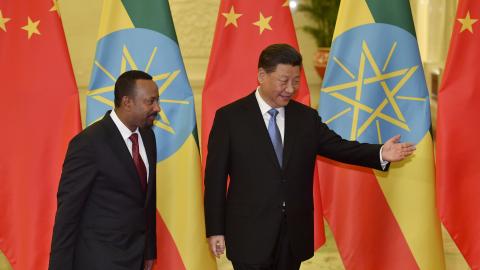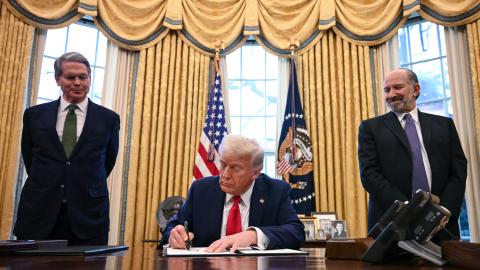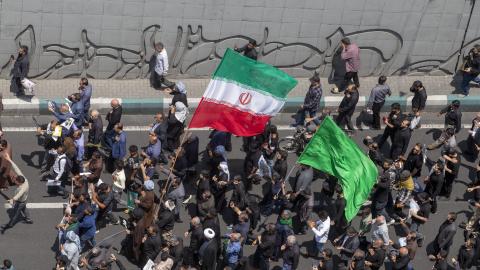Research Fellow Ahmad Hashemi gives a look beyond the mainstream discourse on Iran. For the latest important and revealing developments from the country, subscribe here.
Resistance Axis
News about Iran’s proxy network in the Middle East.
Iran Uses Afghan Immigrants to Improve Raisi Funeral Optics
The Iranian regime bused in Afghan migrants to inflate the number of attendees at the late Iranian President Ebrahim Raisi’s funerals in Qom, Tehran, Mashhad, and other cities. Iranian state news agency IRNA reported that over 100,000 Afghan migrants participated in Raisi’s funeral procession in his hometown of Mashhad.
Why it matters. The fact that the regime needed to mobilize Afghan migrants to create the impression of popularity is another sign of its weakness. Tehran routinely mobilizes foreigners, especially Shiites, to bolster its power at home. In 2022, credible reports stated that the Iranian regime mobilized Hashd al-Shaabi, Kata’ib Hezbollah, and Lebanese Hezbollah members to assist Iran’s Basij paramilitary forces in their crackdown on Iranian protesters. As the Mullahs’ popularity continues to sink, the regime will rely more on proxies to shore up its power.
Hajji Washington
Developments in Iran-US relations.
Mullahs Call for Freedom of Speech in America
In response to anti-Israel protests at United States universities, Iranian authorities have become staunch supporters of America’s First Amendment. Mashhad Friday prayer leader Ahmad Alamolhoda, father-in-law of the late Raisi, condemned police violence and the lack of freedom of speech on US campuses. Alamolhoda said that he appreciated American students who chant their slogans in Farsi. He was likely referring to Antiwar Committee Chicago organizer Shabbir Rizvi, who was filmed teaching a group of activists in Chicago to chant “death to Israel” and “death to America” in Farsi. In addition, Mohammad Hosseini, Iran’s vice president for parliamentary affairs, lauded the “initiative” of Iranian state-run universities that announced they would offer placements and aid to students and professors who have been suspended or expelled from American universities for anti-Israel sentiment.
Why it matters. According to Iranian American historian and educator Abbas Milani, Iranian Supreme Leader Ali Khamenei’s influence is visible in American and European universities. When engaging countries like the US that are not majority Muslim, regime agents tie their ideology to left-wing causes such as anti-colonialism, anti-imperialism, and peace activism.
Love Triangle
On the alliance among Ali Khamenei’s Iran, Xi Jinping’s China, and Vladimir Putin’s Russia.
Post-Raisi Iran Will Remain Russia and China’s Ally
Unlike his predecessor, Hassan Rouhani, Raisi placed Iran’s Look East policy at the center of his approach and wielded anti-Western sentiment to his advantage. Russia and China were among the first to offer their condolences upon Raisi’s death, but some speculated that Iran’s foreign policy might shift away from the Tehran-Beijing-Moscow axis under new leadership.
Why it matters. Analysts and policymakers should understand that Raisi’s death actually does not matter for Iran’s foreign policy. Supreme Leader Ali Khamenei holds religious and political authority over all domestic and foreign affairs. Tehran will continue to see the US as the great Satan, the United Kingdom, France, and Germany as the medium Satans, and Israel as the little Satan, no matter who holds the presidency. Only Khamenei’s death can change this.
Iran and Israel
The latest on the shadow war between the Islamic Republic and the Jewish state.
Iran’s Work Week Reform: Shabbat Shalom?
After a heated debate, Iran’s parliament approved a 40-hour work week with a Friday–Saturday weekend for all government employees.Friday is the Muslim holy day and was previously the only official day of rest in Iran.
Some hardliners and Shiite clerics oppose the addition of Saturday as a day of rest because it is the Jewish Sabbath. Ayatollah Nasser Makarem Shirazi stated that observing the Jewish holy day in Muslim countries would weaken Islamic traditions. Mohammad Javad Haj Ali Akbari, Tehran’s Friday prayer imam, said that this change “hurts the feelings of the believers.” Another cleric, Jafar Sobhani, claimed that “Saturday is the enemy’s day off, not ours!”
Why it matters. Iran has always claimed that it distinguishes between the Jewish people and Zionism. However, hysterical reactions about the Jewish Sabbath indicate, once again, that the Iranian regime simply hates Jews.
Iran vs. Aniran
Tehran’s relations with non-Iranian peoples in and around the Islamic Republic.
Iran’s Distrust of the Turks
The helicopter crash that killed Raisi took place as he was returning from an official visit to Azerbaijan. Consequently, anti-Turkic conspiracy theories have gone viral. According to Omid Dana, an exiled Persian nationalist and media activist, the main culprit is Israel, with Turkey and Azerbaijan acting as collaborators. In his telling, Iranian Azerbaijanis (whom he calls PanTurks) carried out the murder. Dana is not alone in blaming the Turkic world for the helicopter’s downing. A pro-regime activist criticized the Iranian government for asking for help from Turkey, which sent a Baykar-manufactured unmanned aerial vehicle to locate the wreckage. Turkey is a rival of Iran, and Baykar and Iranian drone manufacturers are competitors. The activist theorized that Turkish intelligence-gathering could facilitate sabotage operations.
Styopa Safaryan, the director of the Armenian Institute of International and Security Affairs, also implied that Israel may have had a role in the crash. He noted the technological assistance that Israel gives to agricultural projects in Azerbaijan’s Zangilan region, which borders Iran.
Finally, a pro-regime X account noted Armenian Prime Minister Nikol Pashinyan’s attendance of Raisi’s funeral and criticized Azerbaijani President Ilham Aliyev for failing to show up.
Why it matters. Fear of Turkic peoples and the Azerbaijan-Israel alliance is widespread among ethnic Persians. Given that about one-third of all Iranians are ethnic Azerbaijanis, US policymakers stand to benefit if they pay closer attention to the crosscurrents between Iran’s domestic and regional policies.
The Streets of Tehran
The most debated news, issues, and topics of amusement among Iranians.
While Iranians Celebrated the Butcher of Tehran’s Death, Some in the West Grieved
As Iranians in the country and abroad celebrated the helicopter crash, the United Nations General Assembly paid tribute to Raisi, the US Senate chaplain offered a prayer for the Butcher of Tehran, and the European Union offered its condolences.
Why it matters. Raisi presided over the executions of thousands of political detainees in 1988. Westerners’ feigned sympathy offends affected Iranians, earns contempt from the regime, and demoralizes the Iranian opposition. Mere silence would have been an improvement.
Beyt Update
News from Supreme Leader Ali Khamenei’s office and official residence.
None Dare Correct Khamenei
At the thirty-fifth Tehran International Book Fair, Khamenei picked up Bread and Wine, a novel written by the Italian author Ignazio Silone. The book, he said, sheds light on the atrocities committed by the Turks against the oppressed Greeks. Khamenei’s office released a video of his remarks on May 13, the day of the Greek prime minister’s visit to Turkey.
But the propaganda missed its mark. The book is about Italy under Benito Mussolini and has nothing to do with Greeks and Turks.
Why it matters. Khamenei tries to appear likable and relatable. He engages in mountaineering and hiking, joins poetry readings, and attends book fairs. But he occasionally embarrasses himself, revealing the faults of Iran’s propaganda machine. By distributing his remarks as if they made sense, his staffers’ behavior revealed that the supreme leader rules by fear, and, like most dictators, values loyalty over competence.


















